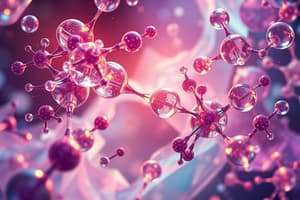Podcast
Questions and Answers
Which of the following best describes the aim of the Natural Products Chemistry course?
Which of the following best describes the aim of the Natural Products Chemistry course?
- Understanding the chemical structure of synthetic compounds
- Introduction to the broad field of Natural Products Chemistry and reviewing major classes of natural compounds (correct)
- Introduction to synthetic chemicals and their properties
- Learning about inorganic compounds and their applications
How are synthetic chemicals different from natural products?
How are synthetic chemicals different from natural products?
- Synthetic chemicals are made by enzymes, while natural products are made by chemically reactive reagents.
- Synthetic chemicals are made by chemically reactive reagents and tend to change structures, while natural products are made by enzymes and are more selective. (correct)
- Synthetic chemicals are obtained from cells of organisms, while natural products are obtained from inorganic sources.
- Synthetic chemicals are less reactive than natural products, while natural products are highly reactive.
What are the sources of chemical compounds for Natural Products Chemistry?
What are the sources of chemical compounds for Natural Products Chemistry?
- Synthetic production processes in laboratories
- Cells of organisms such as plants, fungi, bacteria, and insects (correct)
- Chemical compounds obtained from non-living sources
- Inorganic compounds derived from minerals and metals
How are natural products different from synthetic chemicals in terms of production?
How are natural products different from synthetic chemicals in terms of production?
What is the main focus of the Natural Products Chemistry course with respect to natural compounds?
What is the main focus of the Natural Products Chemistry course with respect to natural compounds?
Flashcards are hidden until you start studying




